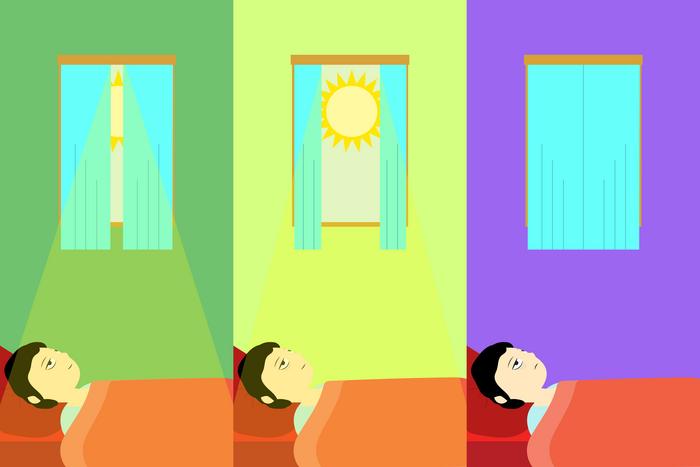Sleep is an integral component of human biology, playing a critical role in physical health, cognitive function, and emotional well-being. However, modern lifestyles, punctuated by the omnipresence of technology and an incessant pace of life, have led to a noticeable decline in sleep quality and duration. Numerous studies underscore the detrimental impacts of poor sleep on health, revealing that insufficient rest can contribute to a host of issues, including increased stress levels, diminished cognitive ability, and a greater susceptibility to chronic diseases. As such, understanding the variables that influence sleep quality has become a focal point for researchers.
Among the various factors impacting sleep, the environmental conditions of the bedroom notably include light, sound, and temperature. These elements have received less attention in residential architecture and interior design, despite their significant impact on sleep quality. Traditional sleep studies frequently utilize artificial light sources due to their controllability; however, they may not accurately mimic the specific dynamics central to actual living environments. Researchers at Osaka Metropolitan University are pioneering work in this area, positing that natural light may hold the key to enhancing sleep quality and, consequently, morning alertness.
In a groundbreaking study led by Graduate School of Human Life and Ecology student Xiaorui Wang, alongside Professor Daisuke Matsushita, the team delved into the relationship between natural light exposure and wakefulness. They conducted a meticulously controlled experiment involving 19 participants who were subjected to three distinct lighting conditions: exposure to natural light for 20 minutes before waking (condition IA), exposure to natural light from dawn until waking (condition IB), and a complete lack of natural light before waking (condition CC). This structure allowed for a thorough examination of natural light’s effects on participants’ physiological and psychological responses.
To correctly simulate these conditions, the researchers employed light-shielding curtains combined with motorized closing devices, establishing a controlled environment in which light exposure could be systematically varied. After each experimental session, participants’ levels of sleepiness, alertness, and fatigue were assessed through a blend of subjective self-report surveys and objective measurements. These included detailed evaluations utilizing electrocardiograms (ECGs) and electroencephalograms (EEGs), which provided critical insights into the participants’ neurological activity during the study.
The results of the study were telling. It was observed that participants who were exposed to natural light in conditions IA and IB exhibited markedly less sleepiness than those in condition CC. This finding supports the notion that even moderate exposure to natural light can serve a vital function in enhancing wakefulness upon rising. Notably, condition IA—where participants experienced natural light shortly before waking—was found to be one of the most effective interventions for improving overall alertness. The implications of these findings suggest that managing light exposure in the bedroom can significantly influence morning awakeness and readiness for daily activities.
Interestingly, condition IB demonstrated that excessive natural light exposure, particularly in the moments leading up to waking, can produce adverse effects on alertness levels. As a result, while natural light has demonstrated an ability to invigorate wakefulness, there exists a threshold beyond which too much light may foster feelings of lethargy rather than alertness. This nuanced understanding of light exposure dynamics offers a new perspective on how best to optimize bedroom environments for enhanced sleep and wakefulness.
Professor Matsushita articulated a hopeful vision for future research: developing systems capable of dynamically controlling natural light in living spaces as a function of seasonal variations and daily rhythms. Such advancements could play a crucial role in creating sleep environments that align more closely with the natural light cycles of day and night, ultimately further enhancing the quality of sleep and the ease of awakening.
Published in the journal “Building and Environment,” this research contributes to a growing body of literature focused on the intersection of environmental design and human health. The ability to harness natural light in innovative ways could become a pivotal aspect of architectural design, allowing for healthier living spaces that promote restorative sleep.
The journey toward optimizing sleep through environmental factors continues to unfold, paving the way for future explorations into the many dimensions that influence human health. As we increasingly acknowledge the importance of natural elements in our daily experiences, this research serves as a compelling reminder of the intrinsic connection between our environment and our well-being.
The implications for public health and well-being are substantial; as urban environments continue to grow denser and technology becomes increasingly integrated into our lives, the pursuit of natural light in our personal spaces may become a crucial factor in mitigating the sleep crisis plaguing societies worldwide. With ongoing research in this domain, we may glean deeper insights that empower individuals to cultivate more enriching sleep environments.
By promoting an understanding of how natural light can be introduced into our bedroom routines, we may not only enhance personal well-being but also inspire architectural innovations that prioritize light management. In an age marked by growing awareness of sleep within the wellness narrative, the findings from Osaka Metropolitan University resonate powerfully, signaling the dawn of a new era of sleep science that appreciates the beauty and necessity of natural light.
In conclusion, as we navigate the complexities of modern living and seek remedies for sleep-related challenges, integrating the science of natural light into our architectural and lifestyle choices could herald a transformation in how we approach both sleep quality and overall health. The pathway forward may well be illuminated by the sun—if we are willing to embrace it.
—
Subject of Research: People
Article Title: Natural light control to improve awakening quality
News Publication Date: 14-Feb-2025
Web References: http://dx.doi.org/10.1016/j.habitatint.2024.103250
References: Published in Building and Environment
Image Credits: Credit: Osaka Metropolitan University
Keywords
Natural light, sleep quality, wakefulness, environmental design, health, Osaka Metropolitan University, human biology, light exposure, alertness, architectural innovation.
Tags: architectural design for better sleepchronic diseases and sleep deprivationcognitive function and sleepeffects of technology on sleepemotional well-being and sleepenhancing sleep qualityimpact of environmental conditions on sleepmodern lifestyle and sleep issuesnatural light benefitsnatural lighting in residential spacesreducing morning fatiguerole of light in sleep health





